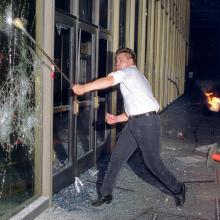kairos
How can we learn to mark time, both chronos and kairos, when so many immediate crises seem to manifest as we sleep through each night? I want to learn to hold both types of time, even when I wake up anxious about the world on any given day. And that means I’ll need to practice mercy with myself and others, which isn’t always easy in hard times. At any given point, I can only be in one place in time.
If I’ve learned anything since my time in Rome, it’s that people — not just Catholics — are hungering to connect peace with justice. This is why those of us who traveled to Rome just before the election, accompanied by Stockton, Calif., Bishop Stephen Blaire, and Houma-Thibodaux, La., Bishop Shelton Fabre, are preparing for a regional WMPM meeting in Modesto, Calif., in February.
To orientate a variety of foreigners for residence in North America, L. Robert Kohls and his staff at the United States Information Agency constructed a groundbreaking article, “The Values Americans Live By.” Kohls felt that visitors to the U.S. needed to understand “common American values” that would allow them to integrate more fully into the predominant cultural currents. All together, “The Values American Live By” highlights numerous ideals that most (but not all) U.S. citizens possess, all for the purpose of awareness building and cross-cultural understanding.
Among the topics Kohls covered in his 1984 article was the importance of time, for people from the U.S. often conceive of time in ways far different from others around the world.
Having achieved our freedom we can fall into the trap of washing our hands of difficulties that others face. We would be less human if we do so…we know too well that our freedom is incomplete without the freedom of the Palestinians.
- President Nelson Mandela- December 1997
There is visceral identification by South Africans with the suffering of the Palestinians.
Newspapers and speakers at South Africa Human Rights Day/U.N. International Day for the Elimination of Racial Discrimination focused on the liberation of the oppressed and the importance of a mobilized civil society to stand with the marginalized. The events commemorate the nonviolent protest against the racial passbooks, March 21, 1960. The day ended tragically with the Sharpeville massacre, which left 69 people dead and 180 injured. Nelson Mandela burned his discriminatory passbook a week later and the long march for freedom and dignity began in earnest. Even when it is still a journey in progress of real equality and democracy for all, there is an intentionality expressed best by Mandela.
This weekend, if you can believe it, marks the 20th anniversary of the Los Angeles riots that followed the verdict in the Rodney King trial that acquitted four police officers of any wrong doing. Maybe some of us are old enough to remember the beating that King took as he was being arrested.
Maybe some of us are old enough to remember the violence that followed. Fifty people died in the riots.
Why do we bother to honor such memories? Why do we hold them up? St. John of the Cross, the Carmelite mystic, writes of a temporal veil that separates us from God. It's an unavoidable separation, he said, that every creature encounters.
We live in time. God does not. He also said, however, that by grace that veil can be torn, time and memory collapsing in upon one another and we are no longer separate from God.

Graffiti on the "security wall" that runs through Bethlehem. Via http://commons.wikimedia.org/wiki/File:Wall_in_Bethlehem6.jpg
A hegemonic power that separates and excludes is not of Jesus. I came away from the deep darkness settling on the land of the Holy One to declare along with my fellow Kairos delegates that, to paraphrase Bishop Marianne, “the fate of the free world depends on a civil society committed to Christ and a persistent, all-encompassing faithful non-violent tenacity pursuing creative and compassionate resistance.“
We must respond to those faithful ones behind both sides of the walls who are saying to us, “Come and See and Be with the people.” We must feel what Jesus felt as he witnessed tyranny and empire – the principalities and powers that oppress and dispossess and kill the poor for whom He had a heart. Please listen to the cries of the oppressed and act today in doing at least one small thing to bring a just peace…make a personal and if possible corporate choice in this critical moment of God’s Kairos.
If all who hear the “Bethlehem Call” respond then momentum will build for the liberation of all God’s children in the Holy Land.




